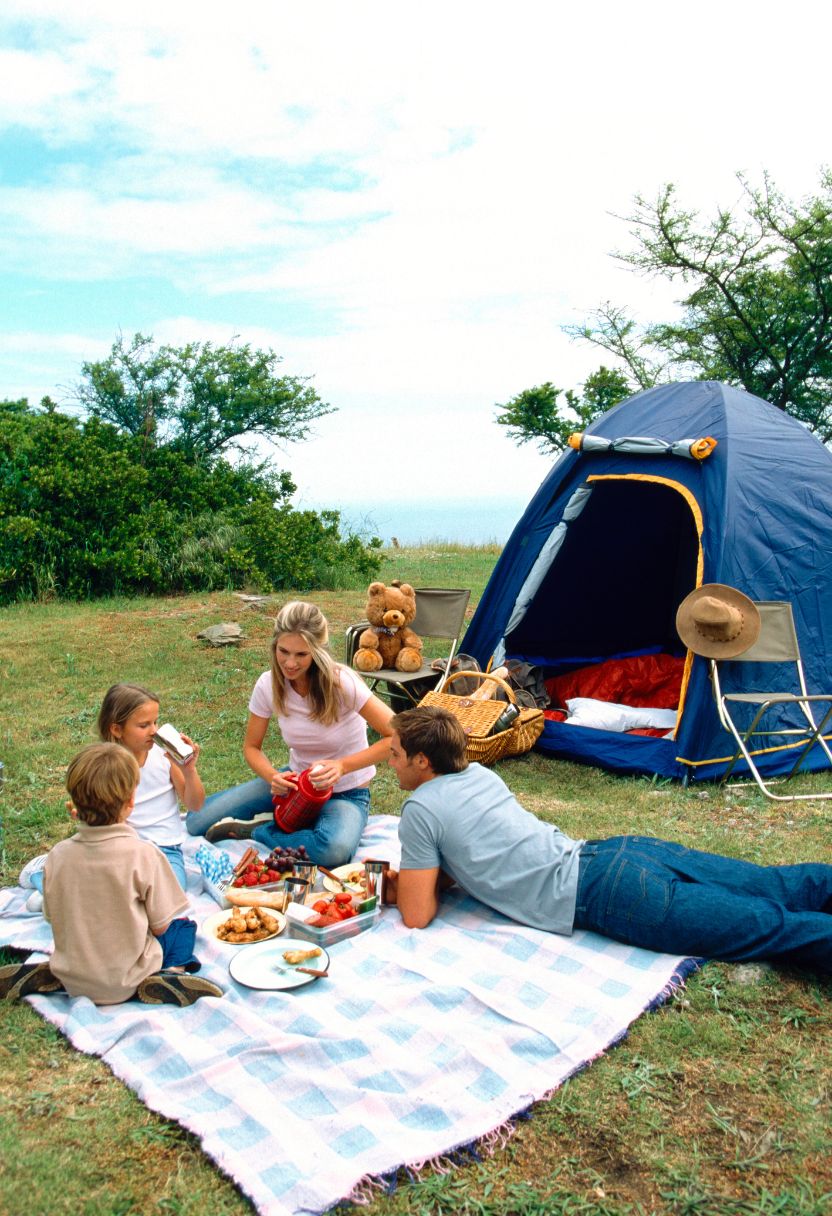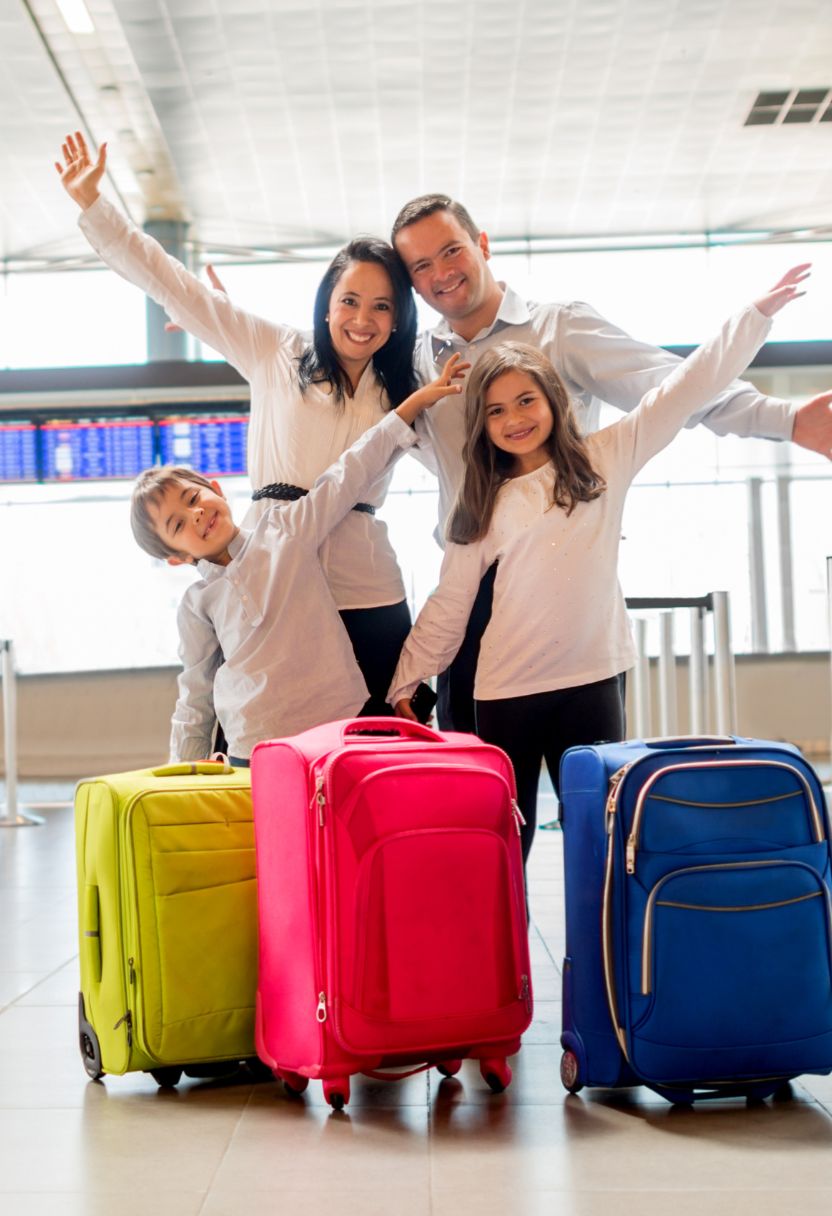

Planning a family vacation can be such an exciting endeavor, but it ain't without its challenges. One of the most crucial aspects that often gets overlooked is budgeting. Believe it or not, having a well-thought-out budget for family travel can make or break your trip. So, why's budgeting so important? Let's dive in.
Obtain the inside story see it. First off, having a budget helps you avoid overspending. Who wants to come back from a fabulous trip only to face mounting credit card bills? Not me! By setting a clear budget, you know exactly how much you can afford to spend on flights, accommodations, meals and activities. It's kinda like having a roadmap for your finances – if you don't have one, you'll probably get lost.
But wait, there's more! Budgeting doesn't just help with managing expenses; it also allows you to prioritize what's truly important for your family's happiness and enjoyment. Maybe you've always dreamt of taking the kids to Disneyland but are worried about the costs. With proper budgeting, you can figure out what sacrifices need making in other areas so that this dream becomes reality.
Now let's talk about peace of mind. Traveling with family ain't no walk in the park; it's stressful enough without financial worries lurking around every corner. When you've got all your expenses planned out ahead of time, you're not constantly fretting over money while trying to enjoy some quality time together. Instead of worrying if you'll run outta cash halfway through the trip, you'll relax and actually savor those precious moments.
Oh! And let's not forget teaching valuable life skills to our kids! When children see their parents planning and sticking to a budget for something as fun as travel, they learn important lessons about financial responsibility and prioritization. Trust me; these lessons will stick with them long after the suitcases are unpacked.
Moreover, budgeting helps ya avoid unnecessary debt – nobody wants that hanging over their heads! It's easy to get caught up in the excitement of booking fancy hotels or splurging on expensive dinners but remember: everything adds up quickly when traveling with family. A little restraint here and there goes a long way toward keeping your finances healthy.
And hey - don't think budgeting means skimping on fun either! Quite contrary actually – by knowing your limits beforehand allows room for spontaneity within reason (yep!). You might find great deals or hidden gems which wouldn't have been possible otherwise.
In conclusion folks', taking some time before embarking on any adventure ensures smoother sailing throughout journey itself (pun intended). Budgeting isn't just about pinching pennies; it's ensuring everyone has memorable experiences while staying financially sound too!
So next time y'all plan that epic getaway consider creating comprehensive yet flexible budget because afterall who doesn't want stress-free travels filled joy laughter?!
Setting Financial Goals for Your Trip
Ah, planning a trip! It's one of those things that can be as exciting as the journey itself. But let's face it: if we don't set financial goals for our trips, things can go south pretty darn quick. I mean, who wants to come back from an amazing vacation only to find you've drained your bank account or, worse yet, piled up a mountain of debt? Not me! So let's dive into setting some reasonable and achievable financial goals.
First off, it's crucial not to underestimate the importance of budgeting before you even book your flight. You don't want to get caught off guard by unexpected expenses-trust me on this one. Start with a broad estimate of how much you're willing to spend overall. This should include everything from flights and accommodation to food and souvenirs. It's okay if you can't pinpoint every single expense right away; just having that rough figure helps keep you grounded.
Now, break down that total amount into categories. For instance, allocate specific amounts for lodging, meals, activities, transportation within the destination, and so forth. It's also wise not to ignore miscellaneous expenses because they do add up! And hey-don't forget travel insurance; it's better safe than sorry!
Once you've got those categories sorted out (and believe me, it feels good when they're all laid out), start researching costs more closely. Look at different options for accommodations like hotels versus Airbnb or hostels versus camping sites. Compare prices on flights through various airlines or consider alternative modes of transport like trains or buses-it might save ya some bucks!
A big part of setting financial goals is being realistic about what you can afford without stretching yourself too thin. If you're constantly dipping into your emergency fund just to enjoy a night out while traveling, something's gotta give! Instead of fancy dinners every night try local eateries-they're often cheaper and give you an authentic experience.
And oh boy-don't fall into the trap of thinking you need luxury at every turn! Sometimes splurging on one special activity is more rewarding than spreading yourself too thin across multiple mediocre ones.
It's also smart not to rely solely on credit cards during your trip (unless racking up interest fees sounds appealing). Set aside cash for daily expenditures based on your budgeted amounts; it makes monitoring spending easier-and lessens surprises when the bill arrives post-trip!
Lastly-and this one's key-build in some wiggle room for unforeseen costs but stick close enough to your plan so things don't spiral outta control.
In conclusion-with all its highs and lows-setting financial goals ahead really helps make sure your trip is both memorable AND financially sound! So take those steps now: estimate broadly first then drill down deeper with research & category allocations while staying realistic throughout-all these efforts will pay off big time when you're savoring every moment worry-free because guess what? You've planned well!
France is consistently one of the most seen country worldwide, attracting over 89 million vacationers in 2019, drawn by landmarks like the Eiffel Tower and the Riviera.
Australia's Great Obstacle Reef is the largest living framework on Earth and can also be seen from outer space, hosting over 2,900 private reefs and 900 islands. The Maldives, recognized for its magnificent overwater bungalows, is comprised of 99% water and just 1% land, making it a unique location for water lovers.
The world's busiest airport by traveler web traffic, Hartsfield-Jackson Atlanta International Airport terminal, saw more than 110 million guests in 2019, acting as a significant hub for travel in the USA.
The Trans-Siberian Train is the longest train on the planet, stretching over 9,289 kilometers from Moscow to Vladivostok and crossing 8 time zones, using among one of the most immersive methods to discover Russia.
When it comes to figuring out the best age to start traveling with kids, there's no one-size-fits-all answer.. Experts and parents alike have a lot of opinions on this matter, and they don't always agree. Many experts suggest that waiting until your child is at least three years old might be a good idea.

Posted by on 2024-07-13
Planning a family vacation can be both exhilarating and stressful, especially when you're trying to keep costs down.. But don’t worry, there are budget-friendly travel tips for each season that won’t leave your wallet feeling empty.

Posted by on 2024-07-13
When it comes to family travel, the secret to keeping things stress-free isn't just in picking the right destination or packing efficiently.. It's really all about budgeting wisely to avoid financial stress.

Posted by on 2024-07-13
Planning the ultimate family vacation without breaking the bank might seem like a daunting task, but it's totally doable if you create a detailed itinerary.. Oh, and trust me, it’s not as boring as it sounds!

Posted by on 2024-07-13
Taking long trips with kids can be quite the adventure – and not always in a good way.. But don't worry, there're ways to keep your little ones cozy and relaxed, turning potential chaos into calm.

Posted by on 2024-07-13
Discovering hidden gems with your family can be an adventure that turns a simple trip into an unforgettable journey.. It's not just about the destination; it's also about capturing those moments through photos and stories to inspire others who are on the lookout for unique experiences.

Posted by on 2024-07-13
When it comes to budgeting and expenses, estimating major costs like transportation, accommodation, and food can be quite the challenge. Let's face it, nobody wants to run out of money mid-trip or get surprised by unexpected expenses. So, how do we go about making sure we're not overspending while still enjoying our journey? Well, it's not rocket science but does require a bit of planning.
First off, transportation is usually one of the heftiest expenses you'll encounter. Whether you're flying, driving, or taking a train, you gotta factor in all those little hidden costs that sneak up on ya. Don't just assume that the ticket price is all you'll pay! There are luggage fees if you're flying or tolls and gas if you're hitting the road. Oh boy! It's easy to overlook these sneaky extras.
Accommodation can also eat up a big chunk of your budget. Now, who doesn't want to stay at a fancy hotel with room service? But let's be real – sometimes that's just not possible if you're trying to save some bucks. Instead of booking the first posh suite you see online, consider alternatives like hostels or vacation rentals. And hey, don't forget about deals and discounts; they're lifesavers!
Food expenses might seem manageable at first glance but trust me-they add up fast! Eating out for every meal will drain your wallet quicker than you'd expect. It's tempting to grab that delicious-looking street food all the time but cooking some meals yourself can save loads of money too. Plus, shopping at local markets isn't only cheaper but also gives you an authentic taste of wherever you are.
So there ya have it: estimating your major expenses in terms of transportation, accommodation, and food isn't impossible if you take some time to plan ahead. Sure there might be bumps along the way-who knew parking could cost so much?!-but a little foresight goes a long way in keeping those surprise costs at bay.
In conclusion (yep I'm wrapping this up!), being mindful about your spending doesn't mean missing out on fun experiences; it just means being smarter with your choices. Happy travels without breaking the bank!


Allocating funds for activities and attractions isn't always a walk in the park. It's one of those tasks that seems simple but can get really complicated real quick. When it comes to budgeting and expenses, you can't just throw money at things and hope they work out. Nope, you've gotta be strategic.
First off, let's talk about prioritization. Not every activity or attraction is worth the investment. You shouldn't spend your entire budget on something that's not gonna give you a good return, whether that's financial or in terms of customer satisfaction. So, it's crucial to identify what's important and what's not.
And oh boy, don't even get me started on hidden costs! It's never just the ticket price or entrance fee; there's always additional stuff like maintenance, marketing, staffing - the list goes on! If you're not careful, these hidden costs will eat up your budget faster than you can say "overdraft."
Speaking of budgets – they aren't set in stone. Flexibility is key here because unexpected things come up all the time. Maybe an attraction turns out to be more popular than anticipated – great news but also more cost for upkeep! Or maybe an activity flops miserably, and now you've got leftover funds that need reallocation.
Now, let's chat about negotiations – yes, they matter! Don't accept the first price tag thrown at you; haggle if you must. Sometimes service providers are willing to offer discounts or added benefits if they know they're competing for your business.
Oh! And don't forget about contingencies... Always have a rainy day fund tucked away somewhere in that budget of yours because things rarely go as planned.
So yeah, allocating funds ain't easy but with some smart planning and flexibility you'll manage just fine! Just remember: prioritize wisely, keep an eye on hidden costs (they're sneaky!), stay flexible with your budget plan and negotiate like your life depends on it (well maybe not literally).
Managing Unexpected Costs and Emergencies: A Realistic Approach
Budgeting, oh boy, it's like a game of chess. You think you've got all the pieces in place, but then an unexpected cost swoops in like a sneaky knight and messes up your whole strategy. Managing unexpected costs and emergencies can be downright frustrating, but it ain't impossible.
First off, let's face it, nobody likes surprises when it comes to money. You're cruising along just fine with your budget – maybe you're even saving a little extra here and there – but then bam! Your car breaks down or you have to visit the ER. It's not that these things won't ever happen; they will, trust me on that one. But how do you handle them without completely derailing your financial plans?
One word: preparation. Yeah, I know it sounds boring and cliché, but having an emergency fund is key. It doesn't need to be huge right away – start small if you must. The point is to have something set aside for those "just in case" moments so you're not scrambling for cash or worse yet, going into debt.
But hey, who am I kidding? Saving isn't always easy either. Life's expenses are constant; there's never enough left over at the end of the month...or so it seems! So what do you do if your emergency fund isn't exactly overflowing? Well first off don't panic - easier said than done though right?
Cutting back on non-essentials might sound painful but sometimes its necessary evil especially during tough times . You know those fancy coffee drinks or eating out every other night? Yeah maybe cut down on those just a bit till things stabilize again . And remember , its temporary fix not permanent lifestyle change unless of course u want make it one .
Another important thing is not ignoring smaller issues before they become big problems . Got minor leak under sink ? Fix asap before turns into full blown flood requiring expensive repairs ! Same goes health issues too ; regular checkups preventive measures go long way keeping bigger bills bay .
And don't forget about insurance folks ! Having proper coverage whether home auto health really save ur bacon when unexpected hits hard .. Sure premiums may seem annoying monthly expense ,but compared potential costs unplanned emergencies well worth peace mind
Lastly communicate with family members partners whoever shares finances ensure everyone aware situation working towards same goals together makes dealing challenges bit less stressful knowing support system place .
In conclusion managing unexpected costs emergencies definitely tricky part adulting journey no doubt bout that . But taking proactive steps such building emergency fund cutting unnecessary expenses addressing small problems early ensuring adequate insurance coverage open communication within household handling curveballs life throws becomes slightly more manageable task overall .

Traveling with family can be a fantastic adventure, but it doesn't have to break the bank. Here are some tips for saving money while traveling with your loved ones without sacrificing fun or comfort.
First off, don't assume you need to fly everywhere. I mean, road trips can be just as exciting! Plus, they give you the freedom to stop and explore along the way. Pack some snacks and games for the kids so you won't have to spend much at rest stops. Trust me, those expenses add up quicker than you think!
When it comes to accommodation, why not consider alternatives like vacation rentals? They're often cheaper than hotels and come with kitchens, which brings me to my next point-cook your own meals when possible. Eating out every day ain't cheap! A simple breakfast or dinner at "home" can save quite a bit of cash.
Don't overlook free activities either. Museums often have free days or discounted rates for families. Parks and beaches are usually free too! It's amazing how much fun you can have without spending a dime. And hey, walking tours are not only budget-friendly but also a great way to learn about new places.
Another tip is flexibility with travel dates. If you're able to travel during off-peak times, you'll find that flights and accommodations are much more affordable. Don't book the first thing you see; shop around for deals on different websites.
And speaking of deals-sign up for newsletters from airlines and travel sites because they sometimes send exclusive discounts that aren't available elsewhere. It might sound annoying getting all those emails but hey, saving money makes it worth it!
Lastly, avoid tourist traps like overpriced souvenirs stores and restaurants in popular areas-they'll drain your wallet faster than anything else. Go where the locals go; it's usually cheaper and more authentic anyway.
So there ya go! Traveling on a budget doesn't mean skimping on experiences or fun-it just requires a bit more planning and creativity. Enjoy your trip without feeling guilty about splurging too much!
When it comes to budgeting and expenses, one area that often gets overlooked is travel. People usually think traveling's expensive, but that's not always the case. By utilizing travel deals, discounts, and rewards programs, you can actually save a lot of money. You just need to know where to look and how to take advantage of those opportunities.
First off, let's talk about travel deals. They're everywhere if you know where to find 'em! Websites like Expedia and Kayak offer special promotions regularly. It's worth checking them out before booking anything at full price. Don't forget about last-minute deals either; sometimes waiting until the eleventh hour can net you some fantastic savings.
Discounts are another great way to cut down on costs. Student discounts, senior citizen discounts, and even membership perks from clubs like AAA can make a significant difference in your overall expenses. It ain't rocket science-just ask if there's a discount available whenever you're making reservations or buying tickets.
Now, let's not ignore rewards programs. If you're not enrolled in any airline or hotel loyalty programs yet, it's high time you did! These programs reward frequent travelers with points that can be redeemed for free flights, hotel stays, and even car rentals. Over time, these points accumulate and can drastically reduce your out-of-pocket expenses.
But hey-not all rewards programs are created equal! Some have restrictions or blackout dates that might limit when you can use your points. Read the fine print carefully so you're not caught off guard later on.
Oh boy-one more thing people often miss is using credit cards wisely while booking their trips. Many credit cards offer cashback or bonus points for travel-related purchases which could add up over time if used correctly.
You see? Traveling doesn't have to break the bank if you're smart about it! By combining travel deals with discounts and taking full advantage of rewards programs-along with a little bit of planning-you'll be surprised at how affordable it can be to explore new places without draining your wallet dry.
So there ya go-a few tips that'll help keep your travels budget-friendly while still letting you enjoy all those amazing experiences you've been dreaming about!
